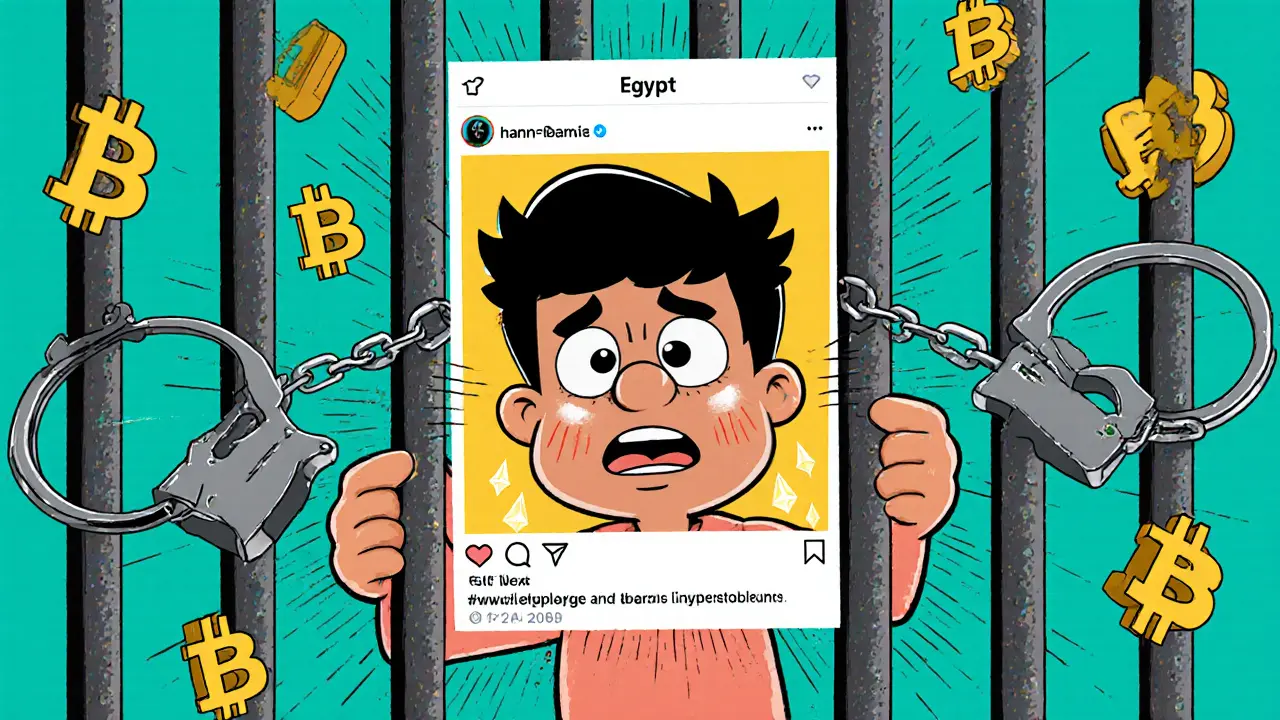Egypt Crypto Promotion Risk Calculator
Risk Assessment Tool
This tool helps you understand the potential legal risks of promoting cryptocurrency in Egypt based on your activities. Under Law No. 194 of 2020, promotion without a license can lead to imprisonment and fines up to LE10 million ($516,000).
Risk Assessment Results
Important: This tool provides general information only and does not constitute legal advice. Actual risks depend on specific circumstances and interpretation by Egyptian authorities.
Potential Penalties
| Penalty Type | Estimated Range | Notes |
|---|---|---|
| Imprisonment | From 1 year to potentially 5+ years based on scale | |
| Financial Fine | LE1 million to LE10 million ($516,000 - $5.16 million) | |
| Additional Consequences | ||
What Counts as Promotion
Under Egyptian law, promotion includes:
- Posting crypto investment opportunities on social media
- Running ads for crypto exchanges or wallets
- Hosting webinars or live streams teaching crypto trading
- Creating YouTube channels or blogs that recommend specific coins
- Operating a Telegram or WhatsApp group that pools money for crypto purchases
If you’re promoting cryptocurrency in Egypt, you could go to jail. Not just a fine. Not just a warning. Actual prison time. That’s not a rumor. It’s the law.
How Egypt Criminalizes Crypto Promotion
Under Law No. 194 of 2020, anyone in Egypt who promotes, advertises, or markets cryptocurrency - even just posting about Bitcoin on Instagram or running a YouTube video explaining how to buy Ethereum - can be charged with a criminal offense. The law doesn’t care if you’re a small influencer or a startup founder. If you’re encouraging people to invest, trade, or use crypto without government approval, you’re breaking the law.The penalties are harsh: imprisonment plus a fine between one million and ten million Egyptian pounds (roughly $516,000 USD). Courts can impose one or both. There’s no minimum sentence listed, but prosecutors have used the law to send people to prison for years, especially if they’re running online platforms or collecting funds from the public.
This isn’t about trading crypto for personal use. Egyptians can still hold Bitcoin or Solana in their wallets. The law targets promotion. That means anything that sounds like a sales pitch: "Earn 20% monthly returns with this crypto staking platform," "Join our Telegram group to buy discounted tokens," or even a TikTok video saying, "This is how I made my first $10K in crypto." All of it is illegal without a license from the Central Bank of Egypt (CBE) or the Financial Regulatory Authority (FRA).
What Exactly Counts as "Promotion"?
The definition is broad - and intentionally so. The FRA has made it clear that any activity that "solicits public investment" without a license is banned. That includes:- Posting crypto investment opportunities on social media
- Running ads for crypto exchanges or wallets
- Hosting webinars or live streams teaching crypto trading
- Creating YouTube channels or blogs that recommend specific coins
- Operating a Telegram or WhatsApp group that pools money for crypto purchases
- Offering staking, lending, or DeFi services without authorization
Even NFTs are caught in this net. If you’re selling NFTs as investment products - say, claiming they’ll appreciate in value or give you dividends - you’re promoting a financial instrument. That requires a license. No license? You’re breaking the law.
The authorities don’t just wait for complaints. They actively monitor platforms. The FRA publishes a "negative list" of unlicensed entities and encourages citizens to report suspicious activity. If you’re promoting crypto online, you’re likely already on their radar.
Why Such Harsh Penalties?
Egypt’s government doesn’t see crypto as innovation. It sees it as a threat. In a 2018 statement, the Central Bank called cryptocurrencies "a danger to national security and financial stability." Their reasoning? Crypto isn’t backed by the state. It’s not regulated globally. It can be used for fraud, money laundering, or evading currency controls.They’re also protecting the Egyptian pound. With inflation running high and the currency losing value, many Egyptians turned to crypto as a hedge. The government didn’t want people bypassing the banking system. So they made promoting crypto a crime - to scare people away.
The punishment isn’t just about punishing violators. It’s a deterrent. The message is clear: If you want to make money from crypto in Egypt, you do it through the state - or not at all.

The Irony: Millions Use Crypto Anyway
Despite the risk, crypto use in Egypt is skyrocketing. A 2022 report from TripleA found Egypt had over 1.7 million crypto owners - the second-highest in the Arab world after Morocco. More recent estimates suggest the number is now close to 3 million, out of a population of over 100 million.People are using crypto to send money abroad, protect savings from inflation, or access global markets. But they’re not promoting it. They’re using it quietly. That’s the disconnect: millions hold crypto, but almost no one openly promotes it. Those who do risk prison.
This creates a dangerous gray zone. A young freelancer in Cairo might use Binance to get paid in USDT. Their friend shares a link to a crypto tutorial on Instagram. That friend could be arrested. The law doesn’t distinguish between personal use and promotion - only the act of encouraging others.
Who Gets Targeted?
The government doesn’t go after every casual user. They focus on:- Operators of unlicensed crypto exchanges or trading platforms
- People running "investment clubs" that pool money for crypto
- Influencers with large followings who promote specific tokens
- Companies offering staking or yield services without FRA approval
There have been multiple high-profile cases since 2021. In one, a man was sentenced to two years in prison for running a Telegram group that helped 2,000 people buy crypto. In another, a woman was arrested for posting videos on TikTok explaining how to use crypto wallets. She wasn’t selling anything - just educating. Still, the court ruled it was "promotion."
Even foreign companies aren’t safe. If your website is accessible in Egypt and you mention crypto in your marketing materials, you could be targeted. The law applies to anyone operating within Egypt’s jurisdiction - including digital content.

Is There Any Legal Way to Promote Crypto in Egypt?
Technically, yes - but it’s nearly impossible.To legally promote crypto, you need a license from both the CBE and the FRA. The requirements are opaque, expensive, and designed to discourage applicants. There’s no public application form. No published checklist. No timeline. No examples of approved entities. No one has publicly confirmed receiving such a license for crypto promotion.
Even banks and traditional financial institutions can’t legally offer crypto services. The Banking Law prohibits the use of virtual assets for financial purposes unless licensed - and no such license has been issued for crypto promotion.
So while the law says "it’s possible," in practice, it’s a dead end. The government doesn’t want crypto promoted. It just wants it gone.
What Happens If You’re Caught?
If you’re arrested for crypto promotion:- You’ll be detained pending investigation
- Your devices and accounts may be seized
- You’ll face charges under Law No. 194 of 2020
- You could be fined up to LE10 million ($516,000)
- You could be sentenced to prison - no minimum, no maximum
- You may be banned from operating any business in Egypt
Legal defense is difficult. Courts rarely rule in favor of defendants in these cases. Judges follow the letter of the law, and the law is clear: no license = crime.
Some people try to argue they didn’t know it was illegal. That doesn’t work. Ignorance of the law isn’t a defense in Egypt.
The Bigger Picture: Egypt’s Anti-Crypto Stance
Egypt isn’t alone in cracking down on crypto. But few countries go this far. China bans crypto trading. India taxes it heavily. Egypt imprisons people for talking about it.This reflects a deeper fear: loss of control. When people use crypto, they bypass the state’s financial system. They don’t need banks. They don’t need the central bank. They don’t need permission.
For a government struggling with debt, inflation, and currency instability, that’s unacceptable. So they criminalize the message - not the technology.
As long as the CBE and FRA hold this position, crypto promotion in Egypt will remain a high-risk activity. No matter how popular it becomes among citizens, the law will not change - not unless the government decides it can’t stop the tide.
Can I get arrested for just talking about crypto on social media in Egypt?
Yes. If your post encourages others to buy, invest, or use crypto - even if you’re not selling anything - it can be considered promotion under Law No. 194 of 2020. Authorities have arrested people for YouTube videos, TikTok tutorials, and Telegram group invites that explain crypto in a way that sounds like a recommendation.
Is it illegal to own cryptocurrency in Egypt?
No. Owning Bitcoin, Ethereum, or any other crypto is not illegal. The law only targets promotion, trading, and operating platforms without a license. You can hold crypto in your wallet. But if you start telling others how to buy it, you risk legal consequences.
What’s the maximum prison sentence for crypto promotion in Egypt?
There’s no fixed maximum sentence listed in the law. Judges have discretion. Most reported cases involve 1 to 5 years in prison, but the law allows for longer terms depending on the scale of the violation. If you’re running a large platform that recruited thousands of users, you could face a longer sentence.
Can foreign crypto companies be punished in Egypt?
Yes. If your website, app, or social media account is accessible in Egypt and promotes crypto to Egyptian users, you can be targeted. Egyptian authorities can request international cooperation to block your site, freeze assets, or pressure local partners. While they can’t arrest you directly if you’re abroad, they can make doing business in Egypt impossible for you.
Are there any licensed crypto promotion platforms in Egypt?
No. As of 2025, no company or individual has publicly received a license from the CBE or FRA to promote, market, or advertise cryptocurrency in Egypt. The licensing process is not transparent, and there are no known approved cases. The law exists, but the legal pathway to compliance does not.

Atheeth Akash
November 11, 2025 AT 18:35Michael Brooks
November 11, 2025 AT 19:25Ruby Gilmartin
November 13, 2025 AT 04:36James Ragin
November 13, 2025 AT 12:40Elizabeth Stavitzke
November 13, 2025 AT 13:22Ainsley Ross
November 15, 2025 AT 07:16FRANCIS JOHNSON
November 16, 2025 AT 00:32David Billesbach
November 17, 2025 AT 19:46Arthur Crone
November 18, 2025 AT 21:13Stephanie Platis
November 20, 2025 AT 15:03Michael Faggard
November 22, 2025 AT 10:32Laura Hall
November 23, 2025 AT 10:34Douglas Tofoli
November 25, 2025 AT 01:54Joanne Lee
November 26, 2025 AT 10:09Brian Gillespie
November 26, 2025 AT 16:24William Moylan
November 27, 2025 AT 16:51Wayne Dave Arceo
November 28, 2025 AT 13:25Andy Purvis
November 29, 2025 AT 09:23